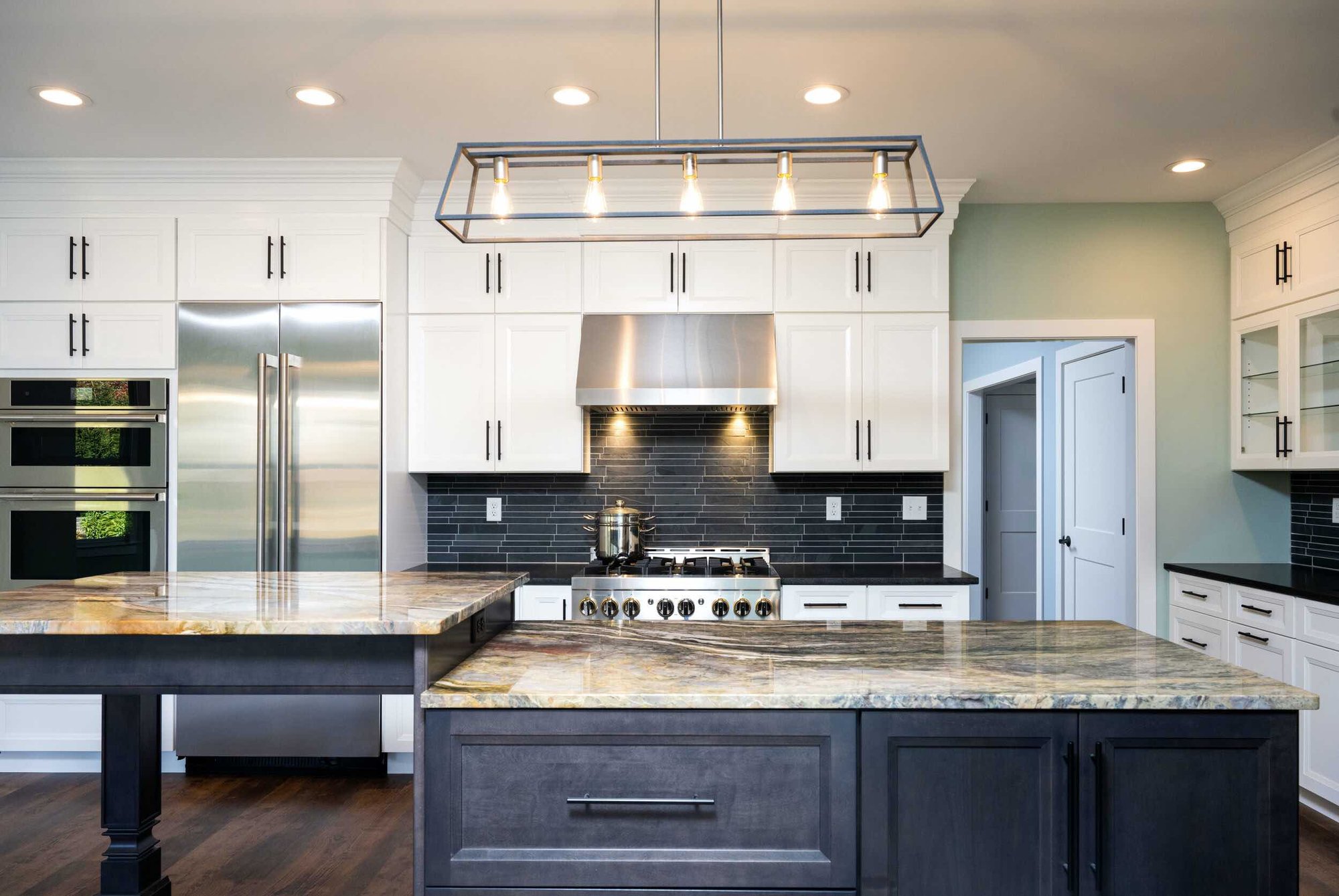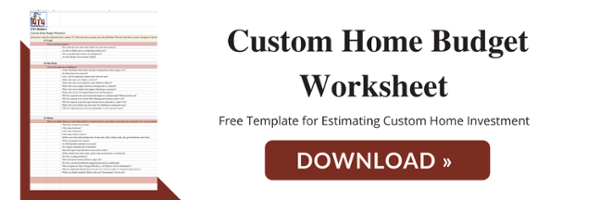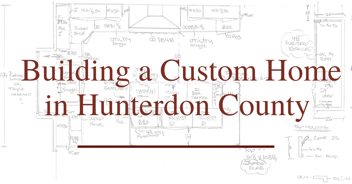4 Min Read
How to Prevent Scope Creep When Building a Custom Home

If you’re considering designing your dream custom home, you might have been warned of scope creep. When it happens, scope creep can dramatically increase your final budget, put your project months behind, and place extra stress on you and your builder.
Scope creep can affect anyone building a new home, but with careful planning, scope creep can be avoided. Keep reading to learn the warning signs of scope creep and how you can keep your new home’s construction on track.
What is Scope Creep?
The scope of a construction project entails the project's goal, strategy to achieve the goal, construction timeline, and planned cost. When planning and designing your new home, you’ll work alongside your builder to understand what you’re looking for in your new home and what you hope to build. This defines your project’s scope.
Scope creep is the moving, changing, or growing of the scope of work while a construction project is underway. Scope creep can take many forms, but it usually happens after significant planning has already occurred, a contract is signed and both sides have invested time and money into the original plan.
What Causes Scope Creep?
Changing the scope of a project mid-way through can disproportionately increase costs and extend custom home building times. Scope creep can also lead to wasted materials and work and can impact the operations management of your contractor—which can negatively impact your project's progress.
Three common causes of scope creep when building a custom home are:
1. Miscommunication When Planning Your Custom Home
The planning phase during the custom home building process is essential to creating a final product you’ll love. This is your opportunity to share everything you’re looking for in your new home with your custom home builder. You’ll discuss the number of bedrooms and bathrooms you need, the type of floor plans you like, your favorite design trends and features, and even your ideal lot location and neighborhood.
Never rush the planning phase for your new home. If your builder doesn’t know exactly what you envision, problems could arise later on when construction is further along—making scope creep inevitable.
2. Evolving Design Preferences
Sometimes, homeowners' design preferences evolve as construction progresses. They might come across new ideas, trends, or materials they'd like to incorporate, which can lead to changes in the project's scope. Frequent change orders and ordering new materials can cause significant timeline delays and higher costs.
3. Expanding Project Objectives
Expanding project objectives—like adding more rooms, features, or even a change in the home's layout—can significantly affect the project's timeline and budget.
How to Avoid Scope Creep
Scope creep can be prevented, with careful planning and research. Knowing what you want, why you want it, and the potential pros and cons of your new future home can help you avoid scope creep.
Make a Concrete List of Project Goals
Start your custom home building project by simply writing a list of goals to be achieved. If you're building a home with your spouse or other members of your household, this could prompt some exciting discussions about your future together.
Ask yourself these important questions:
- Are we planning to grow our family? Do we need space for future additions or pets?
- Would we like to age in place? This would involve incorporating the proper features to make the home more comfortable in the future.
- Are we looking to include an in-law suite for aging parents or family members?
- Do we need more space for work, entertainment, or hobbies?
- Do we want a pool or outdoor kitchen?
- Do we want a fireplace (or more than one)?
- Do we want a property near water or landlocked?
Questions like these can—and should—come up when thinking about what you need in your custom home. The more you explore your future in your new house, the less likely scope creep will be a problem down the line.
Communicate Goals and Wishes to Your Builder
Share your list of goals with custom home builders during the vetting process, to ensure that your goals and strategy are in alignment.
Don't hold back on your desires for your new home during your initial discussions with your home builder. Your builder can help guide you through the design and building process and can help you make design choices to help keep your home within the scope of your budget. Failure to mention something you’ve always wanted could lead to later regrets and even last-minute changes.
Research Your Project Thoroughly
Once you know what you hope to achieve with your home construction project, do some research. This aspect of the planning process covers a lot of ground. You might find yourself exploring a variety of seemingly unrelated topics, but it’s important to study as much as you can. Some suggested topics:
Check Out The Neighborhood
Explore homes in neighborhoods where you're thinking about purchasing a lot. Go to home viewings and ask yourself, what do I like about this home? What don't I like? Collect pictures of new homes that exemplify the finished product you're specifically seeking.
Get to Know Home Design Styles
Explore a range of subjects during your research. Consider architectural style or floor plans. Knowing your favorite architectural styles and floor plans can help you direct your custom home builder during the design process.
Learn About Modern Upgrades for Energy Efficiency
One huge benefit of building a new home is being able to take advantage of the latest advancements in energy efficiency and environmentally sustainable construction. If building an eco-friendly home is important to you, explore the pros and cons of environmentally friendly appliances and building materials.
Sustainable materials might increase your up-front costs but they’ll significantly decrease your monthly bills and increase your home's value.
Know Your Budget and Stick to It
Determine early on how much you can afford to spend on your new home construction project, and don't deviate from that amount. If you’re working with an experienced builder, they can help you plan every aspect of your budget well before construction begins.
You may feel tempted to add features to your new home as the project gets underway, but taking a hard line with your budget can help prevent scope creep. Every change you make to your project while construction is taking place will almost certainly affect the cost, and often for the worst. Taking a disciplined approach can help you avoid such a problem.
Limit Change Orders
Your home builder should have a change order process in place for changes made after a contract is signed. Pay attention to change orders, and read them thoroughly. If the change order does not include mention of the cost impact of a particular change, talk to your contractor. Keep a running tally of changes made and always know how much your new home is going to cost.
Hire a Trustworthy and Reputable Builder
We saved the most important for last! Hiring the right builder for your project is essential for successfully avoiding scope creep. Selecting an inexperienced builder could result in construction mistakes and miscommunication, causing project delays and a frustrating client experience.
Be sure to work with a builder with proven experience who is known for excellent customer service, good communication, and ethical building practices. A good contractor will help you understand the consequences of changes you choose to make during the home building process. They’ll make sure you have all the right information and resources you need to feel confident during the home building process.
Build your Central New Jersey Dream Home
Building a custom home can be a great adventure if you choose the right builder. Contact GTG Builders to get started with your home construction project today.

![Download Now [Custom Home Budget Worksheet]](https://no-cache.hubspot.com/cta/default/4115166/be319467-afd1-4996-acb4-2a5d59bdf4a0.png)

.jpg?width=352&name=NP2_1486%20(1).jpg)

